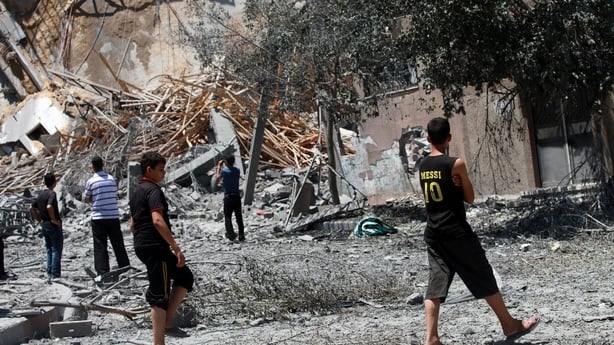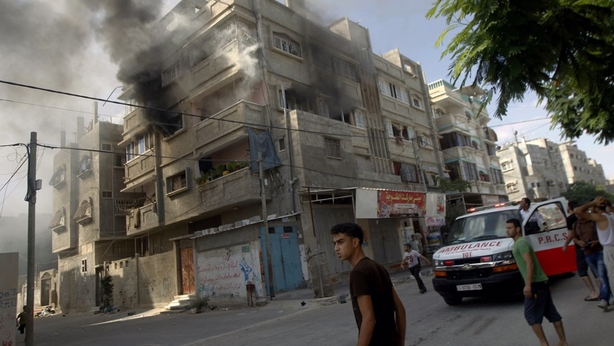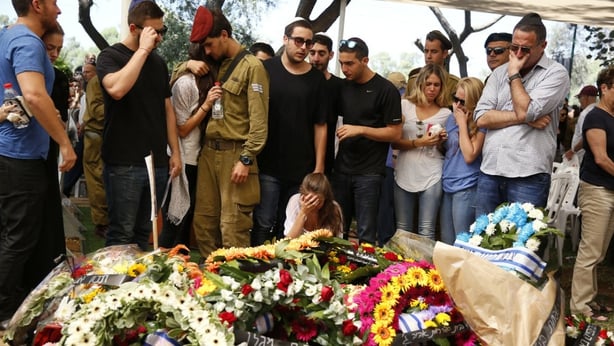 Thursday 31 July 2014 16.38
Thursday 31 July 2014 16.38 Palestinians are "facing a precipice" in Gaza, the head of the main UN relief agency told the UN Security Council in a strongly-worded appeal for action.
With more than 220,000 Palestinians already sheltering in UN facilities - four times the number from the last Gaza conflict in 2008-2009 - Philippe Krahenbuhl said he had reached a breaking point.

"I believe the population is facing a precipice and appeal to the international community to take the steps necessary to address this extreme situation," the head of the UN Palestinian refugee agency UNRWA told the 15-member Council.
"We have exceeded the tolerable limit that we can accommodate," Mr Krahenbuhl said, adding that he was "alarmed" by the latest Israeli instructions to civilians to evacuate two areas in Gaza.
"It is past time for an immediate and unconditional ceasefire as called for by the Council," he said.
"The illegal blockade of Gaza must be lifted."
Mr Krahenbuhl spoke to the Council by audio-link from Gaza after Israel vowed to press on with its military campaign to destroy a network of tunnels used by Hamas militants to attack Israel.
International alarm has grown over the civilian death toll from 24 days of fighting between Israel and Hamas in Gaza, with the Security Council calling for a humanitarian truce in a statement issued early Monday.
More than 1,400 Palestinians, mostly civilians, have died in the fighting, along with 56 Israelis, most of them soldiers.
US Secretary of State John Kerry has said he remained hopeful for a ceasefire in the Gaza conflict but declined to predict when.
Mr Kerry, on a visit to India, said he had remained in close phone contact with players in the Middle East to try to end the Israel-Hamas conflict.
"The United States remains hopeful that it is achievable, and the sooner the better," Kerry said of a ceasefire.
"There is no promise in that, but I think everybody would feel better if there was a bona fide effort," Mr Kerry said.

Israel said, however, it would not pull troops from Gaza until they finish destroying a network of cross-border tunnels, despite sharp United Nations criticism over the Palestinian civilian death toll.
Washington said it had agreed to restock Israel's dwindling ammunition supplies, despite increasing international concern over the death toll in Gaza, where 1,395 people have been killed in 24 days of violence.
UN figures indicate two-thirds of the victims were civilians. Of the civilian dead, nearly half were women and children.
Israel has lost 56 soldiers and three civilians in the conflict.
UN human rights chief Navi Pillay criticised what she said was Israel's "deliberate defiance" of international law.
She lambasted the country's attacks on homes, schools, hospitals and UN facilities which are sheltering 250,000 civilians in Gaza.
"There appears to be deliberate defiance of obligations that international law imposes on Israel," she told reporters.
Ms Pillay said that repeated calls to respect the laws of war had gone unheeded during the latest crisis and previous spikes in the Israeli-Hamas conflict.
Israel has pressed ahead with its offensive and has mobilised an extra 16,000 reservists.
Israeli Prime Minister Benjamin Netanyahu's security cabinet yesterday approved continuing the assault launched on 8 July in response to a surge of rocket attacks by Hamas.
But Israel also sent a delegation to Egypt, which has been trying to broker a ceasefire.
UN Secretary-General Ban ki-Moon has described as unjustifiable the deaths of at least 15 Palestinians yesterday who were among thousands sheltering at a school whose UN administrator said appeared to have been hit by Israeli artillery.
"It is outrageous. It is unjustifiable. And it demands accountability and justice," Mr Ban said.
Israel said its forces were attacked by militants near the school, in northern Jabelya, and had fired back.
It did not immediately comment on another incident, in nearby Shejaia, in which Palestinian officials said 17 people were killed by Israeli shelling near a market.
"Such a massacre requires an earthquake-like response," said Hamas spokesman Fawzi Barhoum, whose group has kept up dozens of daily rocket launches deep into Israel.

The Israelis have kept casualties from the salvoes low with nine Iron Dome interceptor batteries and air-raid sirens that send people to shelters.
Rolling Israeli ground assaults on residential areas, prefaced by mass-warnings to evacuate, have displaced more than 200,000 of Gaza's 1.8 million Palestinians.
The territory's infrastructure is in ruin, with power and water outages.
Israel says it is trying to avoid civilian casualties and blames these on Hamas and other Palestinian factions dug-in for urban combat.
Both sides have voiced openness to a truce, but their terms diverge dramatically.
Israel wants Gaza stripped of infiltration tunnels and rocket stocks.
Hamas rules that out, and seeks an end to a crippling Gaza blockade enforced by Israel and Egypt, which view the Palestinian Islamists as a security threat.
The negotiations are further complicated by the fact Israel and the United States shun Hamas as a terrorist group, while the go-betweens - Egypt, Qatar and Turkey - disagree on Gaza policy.
In the absence of a deal, Israel has ordered its ground forces to focus on locating and destroying a warren of tunnels with which Hamas has menaced its southern towns and army bases.
Israeli military losses are more than five times those from the last Gaza ground war, in 2008-2009, but Israeli opinion polls show strong public support for fighting on until Hamas is quelled.

Mr Netanyahu faces intense pressure from abroad to stand down, however.
The US and the UN Security Council have urged an immediate, unconditional ceasefire by both sides in Gaza to allow in humanitarian relief and for further talks on a more durable cessation of hostilities.
The White House voiced worry at the deaths in Jabelya and other UN-run shelters shelled during the clashes.
Seanad recalled to debate Gaza conflict
Elsewhere, the Seanad is sitting this afternoon to debate the crises in Gaza and Ukraine, having been recalled from its summer break.
Minister for Foreign Affairs Charlie Flanagan said Israel is responding disproportionately to Hamas rocket attacks.
Mr Flanagan said any use of military force in self-defence must be in accordance with international laws.
He said the level of casualties was unacceptable and illustrated this was not the case. He said Hamas must renounce violence.
On Ireland's controversial abstention from a UN resolution, Mr Flanagan said the decision to abstain was a collective EU decision, and was only taken after prolonged deliberations.
He said the EU partners could not resolve differences over how to conduct the investigation.
The minister said if they had not all agreed to abstain, it was highly likely that a number of EU states would have voted against the resolution, which he said would have reduced EU influence even further.
Labour leader in the Seanad Ivana Bacik said she was disappointed with how Ireland's abstention on the UN vote looked, however she said she appreciated EU unity must be preserved.
But she said Ireland needed to push more strongly within the EU for a form of censure for Israel.
Independent Senator David Norris said Ireland's abstention was shameful and he said it was better to be one country in the right, rather than siding with all the rest in the wrong.
He said Israel was unscrupulously using the Holocaust to justify its actions and he said that rag must be torn away.
Anda sedang membaca artikel tentang
UNRWA chief says Palestinians 'facing a precipice'
Dengan url
http://newsdeadlineup.blogspot.com/2014/07/unrwa-chief-says-palestinians-facing.html
Anda boleh menyebar luaskannya atau mengcopy paste-nya
UNRWA chief says Palestinians 'facing a precipice'
namun jangan lupa untuk meletakkan link
UNRWA chief says Palestinians 'facing a precipice'
sebagai sumbernya
0 komentar:
Posting Komentar